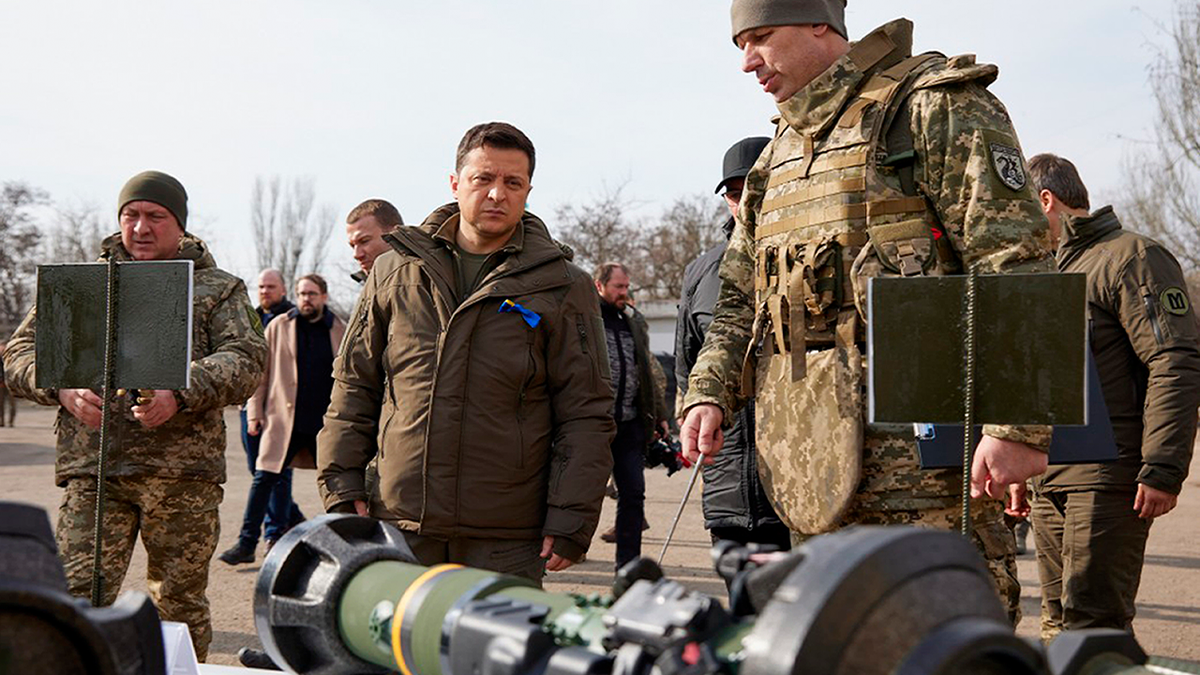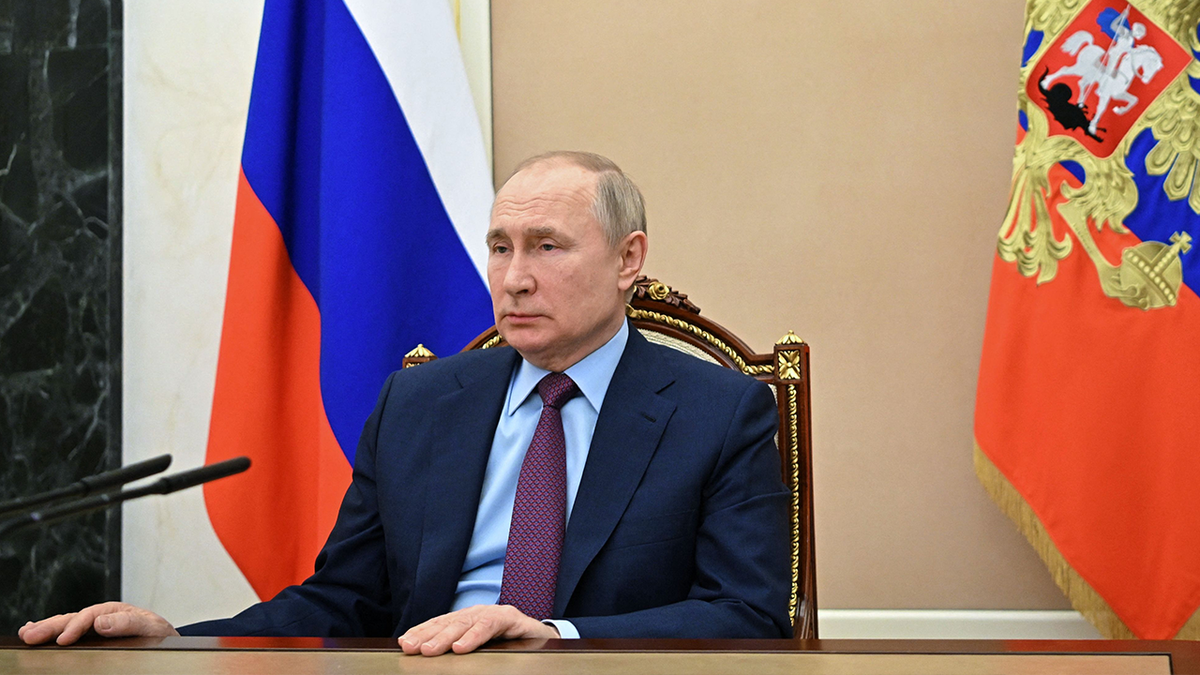Fox News Reporter Amy Kellogg speaks with Denis Volkov
Denis Volkov works at the Levada Center, a respected pollster.
MOSCOW – As one Russian put it, "with all this megaphone diplomacy," there is not much left for the average man to say about where the tense situation between Russia and Ukraine is headed.
This slow march toward - or away from - war is being played out so publicly that armchair quarterbacks are already keeping score of who is winning and who is losing.
And it's an information war. Some say a propaganda war.
U.S. Secretary of State Antony Blinken has warned that Russia could create a pretext for attacking Ukraine by fabricating a terrorist attack on Russian soil or that Russia could stage a fake – or even a real – chemical weapons attack.
"We are laying it out in great detail with the hope that by sharing what we know with the world," he said at the United Nations yesterday. "We can influence Russia to abandon the path of war and choose a different path. While there's still time. Now, I'm mindful that some have called into question our information, recalling previous instances where intelligence ultimately did not bear out. But let me be clear. I am here today, not to start a war, but to prevent one."
KYIV MAYOR PLEADS WITH U.S., GERMANY OVER THREAT OF RUSSIAN INVASION: ‘WE CAN’T DEFEND OUR COUNTRY'
The late Secretary of State Colin Powell's case for war in Iraq, involving the prospect Iraq was hiding weapons of mass destruction, is often cited here; The fact that Russia has, for a long time, denied sending troops to Ukraine in 2014 is not.
Perhaps it's not surprising then that, despite the fact that Russia has repeatedly said it has no intention of attacking Ukraine, Russians are scared there will be a war with their neighbors, according to Denis Volkov of the Levada Center, a respected pollster.
"According to our data many Russians are worried about war," Volkov said. "We see the fear of war is pretty high. It’s more than 50% who have this fear."
And they blame the troubles on the West, he added.
RAND PAUL SAYS UKRAINE JOINING NATO IS A ‘DUMB IDEA' THAT WOULD PROVOKE ‘PARIAH NATION’ OF RUSSIA
"According to our data, the main part of the population held the U.S. responsible," Volkov explained. "They say the government of the United States is pushing the government of Ukraine that is masterminding something against Luhansk and Donetsk republics and in this situation Russian should step in and defend these republics."
The line that Russians here believe is that their people who live in Ukraine are under threat by a nationalist regime.

In this handout photo provided by the Ukrainian Presidential Press Office, Ukrainian President Volodymyr Zelenskyy, center, inspects weapons during a visit to Ukrainian coast guards in Mariupol, Donetsk region, eastern Ukraine, Thursday, Feb. 17, 2022. U.S. Secretary of State Antony Blinken told ABC News that Russian President Vladimir Putin "can pull the trigger. He can pull it today. He can pull it tomorrow. He can pull it next week. The forces are there if he wants to renew aggression against Ukraine." NATO Secretary-General Jens Stoltenberg and Ukrainian President Volodymyr Zelenskyy also dismissed the Russian claims. (Ukrainian Presidential Press Office via AP) (Ukrainian Presidential Press Office via AP)
According to Vladimir Pozner, a one-time Soviet propagandist turned "glasnost" era bridge-builder, the Russian people do in fact feel strongly about Ukraine not joining NATO. He has his own show on Russia’s Channel 1 and discusses these topics at length with policymakers and other people.
Asked whether Russians really believe that NATO or Ukraine is about to attack Russia, Pozner appears to acknowledge that NATO is viewed as a defensive organization, but points to post-Cold War military missions NATO has partaken in around the world as evidence that the term "defensive organization" is seen differently in this part of the world.
RUSSIA TO LAUNCH BALLISTIC MISSILES SATURDAY: KREMLIN
"I think the sense of threat comes from a long time from what the Russians consider a lie to mislead in the promises about NATO's not being enlarged, not moving eastward. The feeling that NATO actually should have been disbanded because it was created to thwart or stand up to the Soviet threat and there was no more Soviet Union and there was no more threat."
Pozner partnered with talk show host Phil Donahue on U.S.-Soviet Space Bridges programs broadcast in the waning years of the Cold War to try to open minds on each side – and then the Berlin Wall fell. There was hope in some quarters that the United States might even end up friends, but it didn't turn out that way.

Russian President Vladimir Putin attends a meeting with Russian Defence Minister Sergei Shoigu at the Kremlin, in Moscow on February 14, 2022. (Photo by Alexei NIKOLSKY / Sputnik / AFP) (Photo by ALEXEI NIKOLSKY/Sputnik/AFP via Getty Images) ((Photo by ALEXEI NIKOLSKY/Sputnik/AFP via Getty Images))
"I have to tell you, frankly, that I put the blame in that particular case at the doorstep of the United States," Pozner, who is both Russian and American, said.
"There were two possibilities: When the United States had to make a decision about this new country called Russia, which had not existed before because it was a Soviet Union, and it could have adopted a kind of Marshall Plan to really help the country move forward in a democratic way," Pozner argued. "And there were others who said they've threatened us for 40 years and they should pay for it. They lost the Cold War and they should pay for it. And ultimately, that's the viewpoint that that was adopted in the end."
Pozner remains hopeful that Russia and America may work past this - one way or another - and become allies.
CLICK HERE TO GET THE FOX NEWS APP
"Well, I've always had that hope precisely because of my background, maybe in that sense, I'm very romantic or idealistic, but I would answer that question with a yes, although I don't have much to stand on when I say that," Pozner says.
There is a sense among some that Russian President Vladimir Putin's stance towards the West may be built on resentment for having been kept out of "the club" as NATO and the European Union expanded, but that club may not have been big enough for two major powers. Putin appears to be building his own club, with membership yet to be established.










































